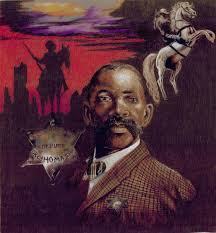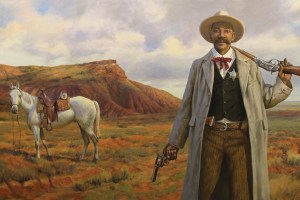|
When we think about the Wild West, the cowboys and the lawman that existed in that era, they are always white heroes. It has been proven that our black figures are left out of history even though they made great contributions to America over the centuries. The Lone Ranger character has its roots in the tale of a man named Bass Reeves who literally was the most feared man in the West. Bass Reeves was born into slavery in 1838 in Crawford County, Arkansas, on a plantation owned by the farmer and state legislator William Steele Reeves. Bass Reeves was named after his grandfather Basse Washington but was given the last name of his slave master William Reeves. In 1846, William Reeves moved his family and businesses to Grayson County, Texas while Bass was still a young man. Bass worked on the Reeves plantation as a water boy until he was old enough to work as a field hand. William Reeves was the principle owner of his plantation and the slaves but his son George R. Reeves was given ownership of Bass. George Reeves served as a sheriff, legislator and a Speaker of the Texas House of Representatives. Bass grew into a fine well-mannered young man standing six feet two inches tall, but his reputation was about to change and he was about to become an American legend. During the Civil War Bass was able to free himself from the ownership of George Reeves because he beat up George after a card game. Information also suggests that Bass ran away from slavery after he learned about slaves receiving their freedom. Bass escaped into territory controlled by the Creek, Cherokee and Seminole tribes. While living with the various tribes he learned how to speak several tribal languages, track his targets, master the rifle, master the pistol, and improve his hunting skills. He became so accurate with his rifle that he was prohibited from participating in shooting competitions. After the passing of the Emancipation Proclamation and the 13th amendment slavery was legally abolished in the United States; these changes meant that Bass was no longer a slave and a fugitive of the law. Bass moved to Van Buren, Arkansas as a free man where he became a farmer, a rancher and he even started a family. He met and married a woman named Nellie Jennie and the couple produced ten children. To help support his family Bass often worked as a scout and a guide for the U.S. Marshals tracking fugitives in the territory owned by the native tribes. Many fugitives ran into tribal territory to escape being arrested and jailed but the Van Buren Courts’ jurisdiction extended into the tribal territories. In 1875, a man named Isaac Parker became the federal judge over the tribal territory, Judge Parker named James Fagan as the U.S. Marshall, and Fagan’s first job was to hire 200 deputy marshals to help arrest the growing numbers of criminals. By this time Bass was well known for his exceptional shooting abilities, his knowledge of many tribal languages, and his tracking skills, so he was highly recommended to become a deputy marshal. Bass accepted the job and became the first black man to serve as a U.S. deputy marshal in the American west. As a deputy marshal Bass served in Arkansas territory, Texas, Muscogee territory and several other tribal territories for thirty two years. He was very successful at capturing his targets which were some of the most notorious criminals in very dangerous areas. Bass could not read or write but his memory was exceptional, he would have an assistant read him the arrest warrant and he remembered how the warrant looked so he never pursued the wrong target or lost the actual warrant. Bass was successful and classy as a deputy marshal, he rode on a white horse and dressed in his finest clothes carrying two pistols on his side. He wore his pistols backwards so he could draw them from their holsters faster in a gun battle. A no nonsense man, he became known for capturing all the criminals he targeted, dead or alive. As a master of disguise he used his tricks to capture two outlaws near the Texas, Oklahoma Red River Valley. He dressed as a homeless man looking for refuge as he approached the house the outlaws occupied. At the time a woman that accompanied the outlaws welcomed Bass into the hose, she did not suspect Bass to be anyone other than who he portrayed himself as. When the outlaws arrived at the house the lady convinced them that Bass was safe and just passing through. When the outlaws fell asleep Bass was able to capture them and lead them into jail. Once again the original lone ranger completed his mission and collected his five hundred dollars. Bass’ most famous capture was the outlaw named Bob Dozier who had a reputation for committing various crimes and escaping capture. Bass pursued Dozier for several months then captured him by killing him in a shootout. An ironic twist of fate led to Bass being arrested and placed on trial from the murder of a cook. He was eventually acquitted with the help of United States Attorney W.H.H. Clayton who spoke favorably about Bass to Judge Isaac Parker. Bass went on to be reassigned to work in Paris, Texas where he apprehended Tom Story of the Tom Story Gang, the outlaw Greenleaf, and outlaw Ned Christie. His wife died in 1896 at Fort Smith, he was later transferred to the Muskogee federal court in tribal territory where he met his second wife Winnie Sumter. Bass’ toughest manhunt was tracking down his own son who had a warrant for murder. As the greatest deputy marshal in the entire west, Bass delivered his son into the hands of the law, he was convicted and sentenced to serve life in prison. One of the last jobs Bass held was a patrolman for the Muskogee and Oklahoma Police Department; it is said that no crimes were committed while Bass was on patrol. In 1910, Bass became sick and eventually died from the sickness as the greatest deputy marshal in the west. In his thirty five year career working with various law enforcement agencies he apprehended over three thousand criminals and killed fourteen. To say Bass Reeves was exceptional would be an understatement, he was one of, if not, the most successful deputy marshal of all-time. It is highly believed that the television show “The Lone Ranger” was based off of the life of this man. Who would have ever thought that a black man would inspire a white television hero? We are learning more and more that our black heroes have inspired a great deal of American culture. The Wild West wasn’t so wild while Bass patrolled the areas. A black man struck fear into the hearts of the most dangerous criminals of that time. Mr. Bass Reeves, we proudly stand on your shoulders. J.A. Ward. References:
https://www.legendsofamerica.com/we-bassreeves/ https://blackamericaweb.com/2018/08/03/little-known-black-history-fact-bass-reeves-2/ https://en.wikipedia.org/wiki/Bass_Reeves https://www.atlasobscura.com/articles/bass-reeves-wild-west-letter-trick
0 Comments
Leave a Reply. |
Details
Categories
All
Click Here to join our mailing list
|
Contact Us: |
Connect With Us |
Site powered by PIT Web Design



 RSS Feed
RSS Feed



